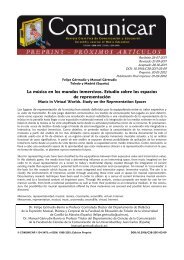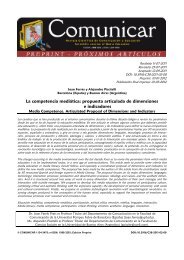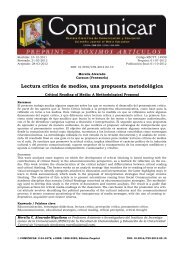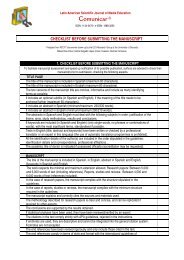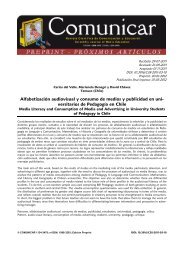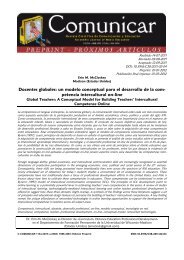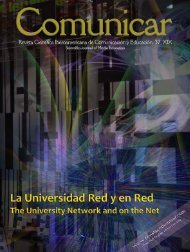Comunicar 39-ingles - Revista Comunicar
Comunicar 39-ingles - Revista Comunicar
Comunicar 39-ingles - Revista Comunicar
You also want an ePaper? Increase the reach of your titles
YUMPU automatically turns print PDFs into web optimized ePapers that Google loves.
190<strong>Comunicar</strong>, <strong>39</strong>, XX, 20123.2.3. The formula for successThese programmes establish a dialectic/tensionbetween talent and popularity as the foundations ofprofessional success (in this case of a singer/dancer). Itis in the contest rules where these tensions are shownmost clearly, specifically in the power shared by thejudges/teachers (guarantors of talent) and the viewers(indications of popularity).In «OT» there is a self-conscious and reflexive discourseon this dialectic, given that the programme’srule design facilitates conflict between these twopoles. The decision about the contestant’s future isshared by four groups of characters who use differentcriteria: the judges, the teachers, the contestants andthe viewers. Consequently, disagreements are constantlyarising between them. Therefore, although thecharacteristics that identify a good singer seem clear(be in tune, interpret correctly, vocalise, have a uniquestyle, be versatile, have charisma), the balance thatshould be established between these is less obvious,especially in relation to the need to be competent atthe vocal level and have the «x factor» necessary forgenerating fans (which is not necessarily linked to thefirst). It is through the game rules that «OT» tips thebalance in favour of this second element: althoughmechanisms are established so that the judges and teacherscan safeguard talent, the rules give more powerto the audience, for example, through the figure of thepublic’s «favourite», who cannot be nominated by thejudges, or the system for choosing the finalists and thewinner, in which the judges have no power at all. Agood example of this is Virginia, who won «OT 2008»after overcoming numerous nominations and the explicitopposition of the teachers and some of the judges.However, in «Fama» there is an attempt to presenttalent and popularity as causal: popularity is adirect consequence of talent and work. In this programmethe teachers are also judges and have a lot ofpower (they can nominate and evict contestants),while the viewers vote to evict contestants, whichmakes it easier for the worst dancers to be eliminated.Only in the last week is all the power given to theaudience to choose their favourite dancer. However,this does not prevent disruptions and conflicts from arisingwithin the programme; an example is Paula andJandro, who reached the final thanks to the audiencevote although their dance technique was not as goodas the rest of the finalists.4. DiscussionIn «OT» and «Fama» professional success isdirectly related to public recognition, and anonymity isrepresented as a problem that needs to be solved.Therefore, fame is prescribed as a life aspiration andthe programmes legitimise the idea that «being famousappears to offer enormous material, economic, socialand psychic rewards» and that stars are at the «centre»of things, so that «if you are not famous then you existat the periphery of the power networks that circulatein and through the popular media» (Holmes &Redmond, 2006: 2).The two programmes tell the story of the metamorphosisof ordinary young people into stars, andapparently they both enter completely into the debateon the democratisation of fame implied by reality TV(Holmes, 2004a, 2004b, 2006; Bennett & Holmes,2010; Turner, 2004: 71-86). Although the traditionaldefinition of a «star» is based on a combination oftalent, hard work and luck, programmes like «BigBrother» disassociate fame from work and talent(Biressi & Nunn, 2005: 144-155). However, «Fama»and «OT» are based on this conventional definitionand this is, perhaps, one of the reasons behind thegreat acceptance of this format (Cáceres, 2002).The fact that the reality TV shows analysed adoptthe traditional definition of fame leads us to identifytwo more values. First, the representation of a meritocraticsociety, in which there is an equal access toopportunities but an unequal result in function oftalent and effort. That is, anyone, thanks to luck, talentand hard work, can be a star, but at the same time theneed to have talent limits the possibilities of success(Marshall, 1997: 79-94). Second (and linked to themeritocracy), stars are paradigms of the individualismon which capitalist societies are based: they are individualswith power and freedom who have arrived towhere their talent and work has taken them independentlyof their origins.However, in «OT» and «Fama» this emphasis onmeritocracy and individualism is made compatiblewith the subordination of the participants: they havelittle power within the plot (remember that they arestill not «heroes») and a strong inequality is establishedbetween them and the other characters of the programme(teachers, judges and viewers). In conclusion,these programmes do not value the individual entrepreneuras much as the «good worker» who is capableof adapting without complaining to the demands of achanging work environment, which calls for constantupdating and reinvention (Ouellette & Hay, 2008: 99-133). Therefore, although the programmes promotethe idea that each participant needs the «x factor»which marks them out from the rest, their objective isto model the contestants. Therefore, these program-© ISSN: 1134-3478 • e-ISSN: 1988-3293• Pages 185-192



